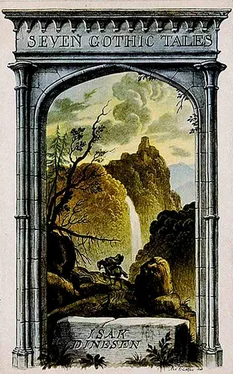Isak Dinesen - Seven Gothic Tales
Здесь есть возможность читать онлайн «Isak Dinesen - Seven Gothic Tales» — ознакомительный отрывок электронной книги совершенно бесплатно, а после прочтения отрывка купить полную версию. В некоторых случаях можно слушать аудио, скачать через торрент в формате fb2 и присутствует краткое содержание. Жанр: unrecognised, на английском языке. Описание произведения, (предисловие) а так же отзывы посетителей доступны на портале библиотеки ЛибКат.
- Название:Seven Gothic Tales
- Автор:
- Жанр:
- Год:неизвестен
- ISBN:нет данных
- Рейтинг книги:5 / 5. Голосов: 1
-
Избранное:Добавить в избранное
- Отзывы:
-
Ваша оценка:
- 100
- 1
- 2
- 3
- 4
- 5
Seven Gothic Tales: краткое содержание, описание и аннотация
Предлагаем к чтению аннотацию, описание, краткое содержание или предисловие (зависит от того, что написал сам автор книги «Seven Gothic Tales»). Если вы не нашли необходимую информацию о книге — напишите в комментариях, мы постараемся отыскать её.
The stories in this collection are:
Deluge at Norderney
The Old Chevalier
The Monkey
The Roads round Pisa
The Supper at Elsinore
The Dreamers
The Poet
Seven Gothic Tales — читать онлайн ознакомительный отрывок
Ниже представлен текст книги, разбитый по страницам. Система сохранения места последней прочитанной страницы, позволяет с удобством читать онлайн бесплатно книгу «Seven Gothic Tales», без необходимости каждый раз заново искать на чём Вы остановились. Поставьте закладку, и сможете в любой момент перейти на страницу, на которой закончили чтение.
Интервал:
Закладка:
THE DELUGE AT NORDERNEY
DURING the first quarter of the last century, seaside resorts became the fashion, even in those countries of Northern Europe within the minds of whose people the sea had hitherto held the rôle of the devil, the cold and voracious hereditary foe of humanity. The romantic spirit of the age, which delighted in ruins, ghosts, and lunatics, and counted a stormy night on the heath and a deep conflict of the passions a finer treat for the connoisseur than the ease of the salon and the harmony of a philosophic system, reconciled even the most refined individuals to the eternal wildness of the coast scenery and of the open seas. Ladies and gentlemen of fashion abandoned the shade of their parks to come and walk upon the bleak shores and watch the untameable waves. The neighborhood of a shipwreck, where, in low tide, the wreck was still in sight, like a hardened, black, and salted skeleton, became a favorite picnic place, where fair artists put up their easels.
On the west coast of Holstein the bath of Norderney thus sprang up and flowered for a period of twenty years. Along the sandy roads of the downs fine carriages and coaches came, to unload trunks and cartons, and ladies on small feet, whose veils and chenilles blew about them in the fresh breeze, in front of neat little hotels and cottages. The Duke of Augustenburg, with his beautiful wife and his sister, who was a fine wit, and the Prince of Noer honored the place with their presence. The landed nobility of Schleswig-Holstein, with pins and needles in their legs from the new political stir, and the representatives of old Hamburg and Lübeck merchant houses, worth their weight in gold, together undertook the pilgrimage into the heart of nature. The peasants and fishermen of Norderney themselves learned to look upon the terrible and faithless gray monster westward of them as upon some kind maître de plaisir.
Here was a promenade, a club, and a pavilion, the rendezvous in the long summer evenings of many sweet colors and sounds. Ladies with marriageable daughters, over whose heads barren seasons of the courts and towns had washed, now watched fruitful courtships ripen on the sunny beach. Young dandies managed their mounts on the long sands in front of clear eyes. Old gentlemen dug themselves down into political and dynastic discussions in the club, their glasses of fine rum at their sides; and their young wives walked, their cashmeres on their arms, to a lonely hollow in the downs, still sun-baked from the long summer day, to become one with nature, with the lyme grass and the little wind-blown pansies, and to gaze straight up at the full moon, high in the pale summer sky. The very air had here in its embrace a scornful vigor which incited and renewed the heart. Heinrich Heine, who visited the bath, held that the persevering smell of fish which clung to them would in itself be enough to protect the virtue of the young fishermaidens of Norderney. But there were other nostrils and hearts to which the rank briny smell was intoxicating, even as the smell of gunpowder over the battlefield. There was even a small casino, where the coquetry with the dangerous powers of existence could be carried on in a different measure. At times there were great balls, and on fine summer evenings the orchestra played upon the terrace.
“You do not know,” said the Princess of Augustenburg to Herr Gottingen, “what a place this is for making you clean. That sea breeze has blown straight through my bonnet and my clothes, and through the very flesh and the bones of me, until my heart and spirit are swept, sun-dried, and salted.”
“With Attic salt, I have noticed,” said Herr Gottingen, and, looking at her, he added in his heart: “God, yes. Precisely like a split cod.”
In the late summer of 1835 a terrible disaster took place at the bath of Norderney. After a three days’ storm from the southwest, the wind sprang around to the north. This is a thing that happens only once in a hundred years. The tremendous mass of water driven up by the storm was turned and pressed down in the corner, upon the Westerlands. The sea broke the dikes in two places and washed through them. Cattle and sheep were drowned by the hundred. Farmhouses and barns came down like card castles before the advancing waters, and many human lives were lost even as far as Wilsum and Wredon.
It began with an evening of more than ordinarily heavenly calm, but of stifling air and a strange, luminous, sulphurous dimness. There was no distinguishable line of division between the sky and the sea. The sun went down in a confusion of light, itself a dull red like the target upon the promenade. The waves seemed of a curious substance, like jellyfish washing up on the shore. It was a highly inspiring evening; many things happened at Norderney. That night the people who were not kept awake by the beating of their own hearts woke up, terrified, by a new, swiftly approaching roar. Could their sea sing now in this voice?
In the morning the world was changed, but none knew into what. In this noise nobody could talk, or even think. What the sea was doing you could not tell. Your clothes were already whipped off you before you got in sight of the sand, and the salt foam whirled sky high. Long and towering waves came in behind it, each more powerful than the last. The air was cold and bitter.
The rumor of a ship run aground four miles to the north reached the bath, but nobody ventured out to see it. Old General von Brackel, who had seen the occupation of East Prussia by Napoleon’s armies in 1806, and old Professor Schmiegelow, the physician to the princely house of Coburg, who had been in Naples at the time of the cholera, walked out a little together, and from a small hill watched the scenery, both quite silent. It was not till Thursday that the flood came. By then the storm was over.
By this time, also, there were not many people left at Norderney. The season had been drawing to a close, and many of the most illustrious guests had gone before the time of the storm. Now most of the remaining visitors made haste to depart. The young women pressed their faces to the window panes of their coaches, wild to catch a last glimpse of the wild scenery. It seemed to them that they were driving away from the one real place and hour of their lives. But when the grand coach of Baron Goldstein, of Hamburg, was blown straight off the road on the dike, it was realized that the time for quick action had come. Everybody went off as speedily as possible.
It was during these hours, the last of the storm and the first of the following night, that the sea broke the dikes. The dikes, made to resist a heavy pressure from seaward, could not hold when sapped from the east. They gave way along a stretch of half a mile, and through the opening the sea came in.
The farmers were awakened by the plaintive bellowing of their animals. Swinging their feet out of bed, in the dark, they put them down in a foot of cold, muddy water. It was salt. It was the same water which rolled, out to the west, a hundred fathoms deep, and washed the white feet of the cliffs of Dover. The North Sea had come to visit them. It was rising quickly. In an hour the movables of the low farmhouses were floating on the water, knocking against the walls. As the dawn came, the people, from the roofs of their houses, watched the land around them change. Trees and bushes were growing in a moving gray ground, and thick yellow foam was washing over the stretches of their ripening corn, the harvest of which they had been discussing on the last days before the storm.
There had been such floods before. A few old people could still recount to the young how they had once been snatched from their beds and hurled upon rafts by their pale mothers, and had seen, from the collapsing houses, the cattle struggle and go under in dark water; and how breadwinners had perished and households had been ruined and lost. The sea did such things from time to time. Still, this flood lived long in the memory of the coast. By coming on in summer time, the deluge assumed the character of a terrible, grim joke. In the annals of the province, where it kept a place and a name of its own, it was called the flood of the Cardinal.
Читать дальшеИнтервал:
Закладка:
Похожие книги на «Seven Gothic Tales»
Представляем Вашему вниманию похожие книги на «Seven Gothic Tales» списком для выбора. Мы отобрали схожую по названию и смыслу литературу в надежде предоставить читателям больше вариантов отыскать новые, интересные, ещё непрочитанные произведения.
Обсуждение, отзывы о книге «Seven Gothic Tales» и просто собственные мнения читателей. Оставьте ваши комментарии, напишите, что Вы думаете о произведении, его смысле или главных героях. Укажите что конкретно понравилось, а что нет, и почему Вы так считаете.












